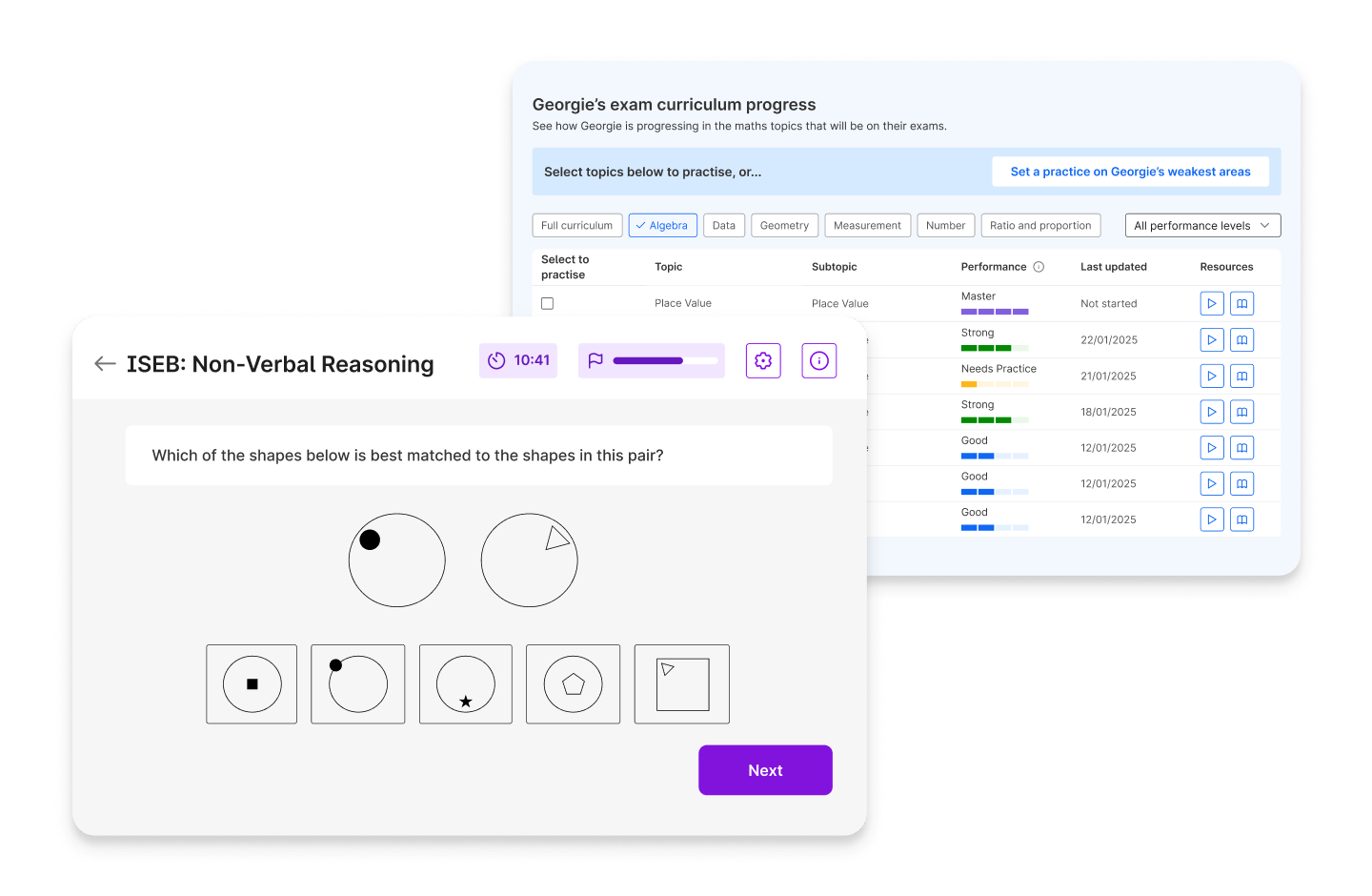ISEB Pre-Test: improving your child's performance

If your child is sitting the ISEB pre-test this autumn, you might feel a mixture of pride, nerves and pressure. It’s a big moment, and it’s natural to feel unsure about how best to support them. The good news? With the right preparation and guidance, the ISEB doesn’t have to feel overwhelming.
Atom Home is designed to guide your child through every stage of preparation, building knowledge, filling gaps, and boosting confidence so they can perform at their best on exam day.
In this blog, we’ll cover:
- What the ISEB Common Pre-Test is and why schools use it
- Why many children find it challenging, and how to overcome this
- Practical, reassuring ways to prepare effectively at home
- Adjustments available for SEND and EAL candidates
- A final word of reassurance for parents
What is the ISEB Common Pre-Test?
The ISEB (Independent Schools Examination Board) Common Pre-Test is an online, adaptive exam taken by Year 6 pupils as part of the admissions process for particular independent schools in the UK.
It assesses four key areas: English, maths, verbal reasoning (VR) and non-verbal reasoning (NVR). Children sit the test once, usually between October and December of Year 6, and the results are shared with all schools that use it, reducing the number of separate entrance exams your child will need to take.
Children who perform well will often be invited to sit further assessments or second-stage exams set by individual schools, typically in January.
Parents are now responsible for registering their child for the ISEB Common Pre-Test. Parents/guardians can register their child between June and early May, on the ISEB website.
Find out more about the ISEB Pre-Test by reading our complete guide - ISEB Common Pre-Test: the ultimate parents' guide.
Is your child ready for the ISEB Pre-test?
See where they stand in minutes. Atom’s free ISEB baseline tests give you an instant breakdown of their strengths and gaps. Know exactly what to focus on next and start preparing with direction, not uncertainty.
.png)
Key dates
- 1st September - 16th June: Register your child for the ISEB Common Pre-Test. Registration information can be found here.
- 1st October - 30th June: Candidates will sit the Pre-Test within this window.
Most Year 6 pupils applying to senior schools will take the Pre-Test between October and December. The exact date, time and location are set by your child’s senior school or their current prep school.
Parents and guardians: Sign up to the Pre-Tests 2025-26 mailing list for important information, support and resources.
Why is the test challenging?
For many children, the ISEB pre-test feels different from anything they’ve done before.
There are three main reasons:
- Verbal and non-verbal reasoning aren’t taught on the national curriculum. Since these are entirely new skills for most children, they often find these sections the hardest.
- It’s adaptive. The test adjusts to your child’s ability in real time. Your child will be marked on their accuracy from the start of the test.
- It’s timed. Each of the four sections is individually timed, lasting 25-40 minutes, with breaks in between. Some schools may even spread the sections over different days. One of the main challenges of the ISEB pre-test is managing the time limits and working at an appropriate pace within each section.
These challenges are completely normal. With structured preparation, your child can approach the test with confidence.
How to prepare effectively
Preparing for the ISEB pre-test isn’t about perfection; it’s about steady progress, building familiarity with the exam format, and helping your child feel calm and confident.
Here are some effective ways to support their preparation:
1. Strengthen reading and comprehension
Regular reading is one of the simplest and most powerful ways to build English and verbal reasoning skills. The goal isn’t to force through a list of “must-read” books but to nurture a love of reading.
- Set aside a daily reading slot and read alongside your child to make it feel like a shared routine rather than a task.
- Encourage them to move on if a book doesn’t capture their interest after a few chapters; enjoyment is key.
- If motivation dips, a small reward, like a later bedtime on reading nights, can help keep it fun.
Download Atom’s free reading lists for inspiration!
2. Build numeracy fluency
Confidence with numbers can make a big difference in the maths section. Children comfortable with mental arithmetic find it easier to work through questions calmly, leaving time for the more challenging ones.
- Focus on strengthening times tables, number bonds and simple calculation strategies.
- Keep practice light and engaging with maths games or learning apps, so it feels more like play than revision.
- Atom’s adaptive maths practice identifies where your child needs support and provides tailored questions to build their skills step by step, helping them grow confident and exam-ready without added stress.
3. Practise with adaptive online tests
The ISEB pre-test is online and adaptive, so practising in the same environment can make a big difference. This removes the “unknown” and helps your child build a sense of familiarity and confidence before the real exam.
- On Atom Home, your child experiences the same adaptive style as the real exam.
- The platform identifies areas where they need more support and creates personalised practices, so they can focus on what matters most.
- The format will feel familiar when your child sits the actual exam, giving them the confidence to know what to do on exam day.
Support for SEND and EAL candidates
If your child has special educational needs, a disability, or speaks English as an additional language, you can be reassured that the ISEB pre-test has been designed to be accessible.
Adjustments can be made based on your child’s needs, and in some cases, schools may decide that certain parts of the test are unnecessary. For example, EAL candidates might be allowed to use a standard bilingual paper dictionary.
To ensure your child receives the right support, it’s important to notify the senior schools of their specific needs well before the test. This ensures that appropriate arrangements are placed so your child can perform to the best of their ability.
Key takeaways
- The ISEB pre-test is an online, adaptive exam in English, maths, verbal reasoning and non-verbal reasoning.
- Children usually sit the test between October and December of Year 6; results are shared with all schools applied to.
- The exam lasts 2 hours 15 minutes and is split into four timed sections.
- Verbal Reasoning and Non-verbal Reasoning are not taught on the national curriculum, so extra practice at home makes a big difference.
- Mock tests and progress tracking are key to building exam technique and identifying areas for improvement.
- Always let schools know if your child has SEND or EAL needs, so the right support can be arranged.
Remove the guesswork from ISEB prep.

Worried about how your child will perform in the ISEB Common Pre-Test? The adaptive format can feel unpredictable, but their preparation doesn’t have to.
Atom adapts to your child’s level as they work. We show you exactly what they need to practise and how they’re progressing.
- Follow personalised weekly exam plans that adjust to your child’s performance and show them what to learn next.
- Practise with replica ISEB mock tests that generate new questions every time, so they build real exam skills.
- Track progress and see how they compare to others preparing for the ISEB Pre-Test.
Start your free trial and watch your child master every ISEB subject.



